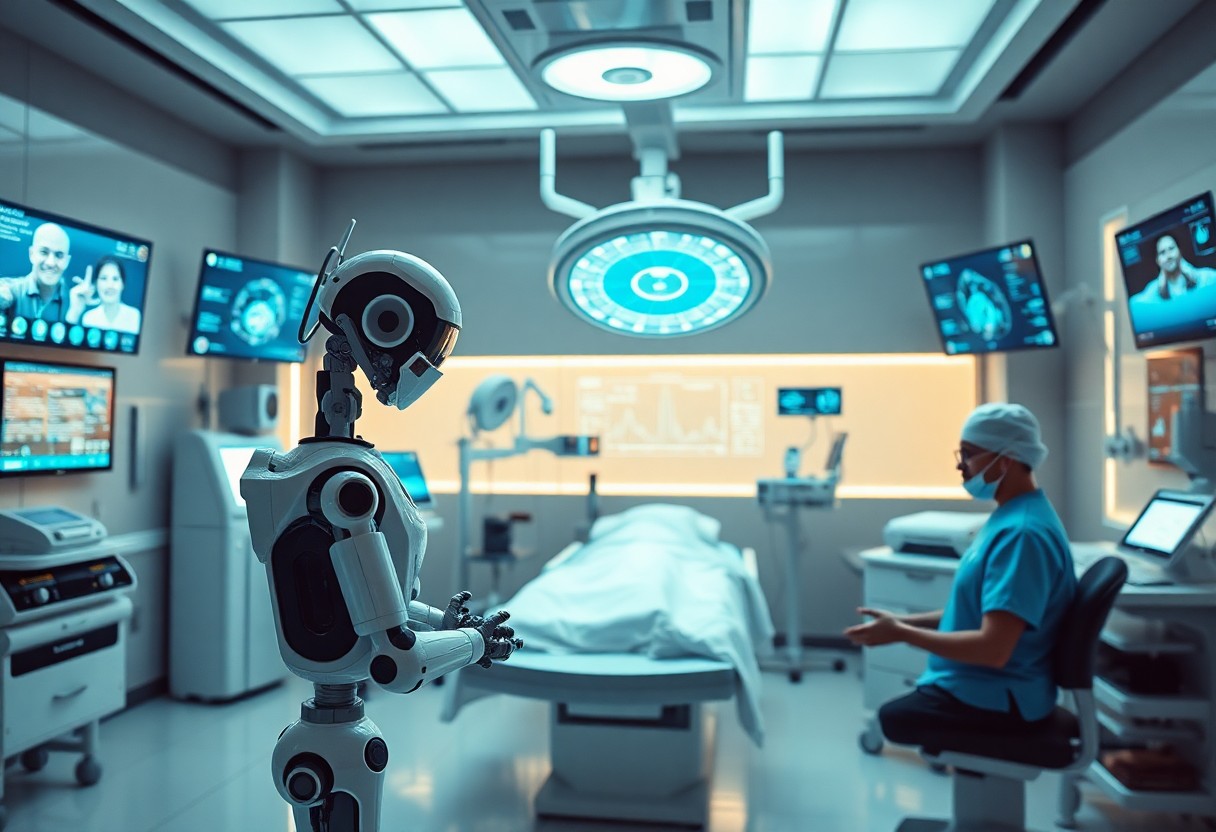Futuristic Technology In Healthcare – A New Era Of Innovation
Seasonal Low-Calorie Recipes – Eating Healthy Year-Round
March 28, 2025Satisfying Low-Calorie Breakfasts To Start Your Morning Right
March 31, 2025Healthcare is rapidly evolving, and advanced technologies are at the forefront of this transformation. You are entering a new era where artificial intelligence, telemedicine, and wearable devices not only improve patient outcomes but also enhance the efficiency of healthcare systems. These innovations can potentially reduce medical errors and offer personalized treatment plans that cater specifically to your needs. Understanding these technologies will empower you to navigate and benefit from the future landscape of healthcare.
The Rise of Telemedicine
Before the advent of telemedicine, accessing healthcare often required long waits and inconvenient travel. Today, advancements in technology have transformed the landscape, enabling patients to connect with healthcare providers from the comfort of their homes. This shift not only reduces barriers to care but also personalizes the patient experience, ensuring that you receive timely medical attention without the hassle of traditional appointments.
Virtual Consultations
An increasing number of healthcare professionals are now offering virtual consultations, allowing you to engage with your doctor through video calls or secure messaging. This innovation not only saves you time but also provides a convenient solution for non-emergency medical issues, keeping you connected with your provider in a way that suits your schedule.
Remote Patient Monitoring
Remote patient monitoring is revolutionizing how chronic conditions are managed. This technology enables healthcare providers to track your health metrics in real-time without needing an in-person visit, making it easier for you to stay engaged in your health journey.
In addition, remote patient monitoring leverages wearable devices and mobile apps to collect data on your vital signs, physical activity, and medication adherence. This continuous stream of information allows healthcare professionals to detect any potential issues early, ensuring timely interventions. While the benefits of increasing your engagement and improving outcomes are significant, be aware of the possible privacy concerns associated with sharing your health data. Balancing convenience with security is crucial as you navigate these technological advancements in healthcare.

Artificial Intelligence in Diagnostics
While artificial intelligence revolutionizes diagnostics, it enables clinicians to analyze vast amounts of data quickly and accurately. By harnessing advanced algorithms, it aids in identifying conditions, predicting outcomes, and personalizing treatment plans. As a result, you can expect faster diagnoses, reduced errors, and improved patient outcomes, paving the way for more efficient healthcare delivery.
Machine Learning Algorithms
With machine learning algorithms, you can leverage the power of data to enhance diagnostic accuracy. These algorithms learn from historical patient data, recognizing patterns and anomalies that may be overlooked by traditional methods. As a result, your healthcare providers can make more informed decisions, ultimately leading to better healthcare outcomes.
Predictive Analytics
Artificial intelligence employs predictive analytics to anticipate patient complications and outcomes. By analyzing historical data and trends, you benefit from proactive interventions tailored to your unique needs. This approach not only optimizes care but also enhances resource allocation in healthcare settings.
And by implementing predictive analytics, you can significantly reduce hospital readmission rates and improve overall patient management. Advanced algorithms analyze patient history, demographics, and clinical data to forecast potential health issues before they arise, allowing for timely interventions. This proactive strategy not only enhances patient safety by identifying high-risk individuals but also streamlines healthcare services, making them more efficient. As you engage with these innovative tools, your overall experience as a patient will improve, leading to better health outcomes and a more personalized approach to your healthcare journey.
Robotics in Surgery
The integration of robotics in surgery represents a transformative leap forward in medical technology, enhancing precision and outcomes. These sophisticated systems allow surgeons to conduct procedures with remarkable accuracy, ultimately benefiting you by reducing recovery times and minimizing complications. Through advanced robotics, healthcare professionals can perform complex surgeries that were once deemed impossible, ushering in a new era where innovation and patient care go hand in hand.
Minimally Invasive Procedures
By utilizing robotic systems, surgeons can conduct minimally invasive procedures that involve smaller incisions. This technique leads to decreased tissue damage, less pain, and shorter recovery periods for you as a patient. With enhanced visualization and precision, robotic systems enable healthcare professionals to achieve outcomes that improve your overall experience and satisfaction.
Robotic-Assisted Surgery
By adopting robotic-assisted surgery, you gain access to less invasive options alongside increased precision. These innovative systems empower surgeons to perform intricate procedures with unmatched dexterity, often resulting in better surgical outcomes and shorter hospital stays. Additionally, the advanced technology helps mitigate risks associated with traditional open surgeries.
A significant advantage of robotic-assisted surgery is its ability to minimize the size of incisions when needed, which is particularly beneficial for you as it allows for a quicker recovery process. This revolutionary approach enhances a surgeon’s ability to navigate complex anatomy while maintaining a steady hand, ultimately leading to fewer complications and improved patient safety. Furthermore, the precision offered by robotic assistance enables surgeons to perform procedures like prostatectomies and hysterectomies with greater effectiveness, ensuring you achieve optimal results and a smoother overall experience.
Wearable Health Technology
Despite traditional healthcare methods, wearable health technology is transforming how you monitor and manage your well-being. These devices, specially designed to track various health metrics, empower you to take charge of your health like never before. With innovative features and user-friendly designs, wearables make it easier to gather real-time data, providing insights that can enhance your health journey.
Health Tracking Devices
After the advent of wearable health technology, health tracking devices have gained immense popularity. These gadgets can monitor your heart rate, sleep patterns, and physical activity, allowing you to make informed decisions about your lifestyle and well-being.
Integration with Mobile Apps
Health tracking devices seamlessly integrate with mobile apps to enhance your health experience. This integration allows you to access and analyze your health data, set personalized goals, and receive reminders for medications or appointments. Leveraging this technology, you can experience a more interconnected healthcare journey. Utilizing mobile apps, you gain the ability to share this vital information with your healthcare providers, ensuring a comprehensive approach to your health management. Additionally, this integration fosters a sense of engagement, motivating you to prioritize your wellness while tracking your progress consistently.
Blockchain for Medical Records
Once again, blockchain technology is revolutionizing how healthcare manages your medical records. By utilizing decentralized ledgers, your data becomes more secure and readily accessible to authorized providers, minimizing the risk of unauthorized access. Futuristic tech in healthcare is incredibly cool, but how are we ensuring data integrity and patient autonomy through this innovative approach?
Security and Privacy
With blockchain, your medical records are stored in a secure manner that enhances both security and privacy. Each transaction is encrypted, and access is controlled through permissions, making it significantly harder for malicious actors to tamper with your sensitive information.
Data Interoperability
Medical records stored on blockchain are designed for seamless data interoperability. You can share your information efficiently across different healthcare systems, ensuring that qualified professionals have the information they need to provide personalized care.
Privacy is enhanced as blockchain allows you to control who accesses your data. By minimizing data silos, blockchain not only facilitates sharing but also ensures that individuals manage their own health information. This can foster improved patient collaboration while maintaining high levels of data protection, ultimately resulting in a more transparent relationship between you and healthcare providers.
The Internet of Medical Things (IoMT)
Not only has the Internet of Medical Things (IoMT) transformed healthcare, but it has also redefined patient care through seamless connectivity. This network of connected devices allows for unprecedented monitoring, enabling healthcare providers to gather critical information from patients in real-time. As a result, healthcare can be more personalized, efficient, and proactive, ultimately leading to improved patient outcomes.
Connected Medical Devices
Against traditional healthcare systems, connected medical devices pave the way for enhanced communication between patients and their healthcare teams. Wearable technology and remote monitoring tools keep healthcare providers informed about your health status, allowing for tailored treatment plans that adapt to your specific needs. This shift towards connectivity signifies a proactive approach to managing chronic conditions, ensuring you’re always supported.
Real-Time Data Exchange
By facilitating real-time data exchange, IoMT enhances how your health information is shared and utilized. Immediate access to your health data allows healthcare professionals to make informed decisions swiftly, reducing delays in treatment and improving overall efficiency.
Also, the importance of real-time data exchange cannot be overstated in modern healthcare. This capability ensures that your healthcare providers have immediate access to vital information, allowing for prompt interventions and better care coordination. When your health data is consistently updated and shared through connected devices, it fosters a more responsive healthcare ecosystem. Additionally, this technology minimizes the risks associated with miscommunication or delays, leading to significantly improved patient safety and satisfaction. Embracing this innovation ultimately empowers you to take an active role in your health management.
Conclusion
From above, it is evident that futuristic technology in healthcare represents a transformative shift in how you experience medical services. Innovations such as telemedicine, AI diagnostics, and personalized medicine not only improve efficiency but also enhance your overall care. As you navigate this new era of innovation, embracing these advancements can empower you to take control of your health and well-being like never before. The future of healthcare is bright, and you are at the forefront of this exciting evolution.
NEWSLETTER






